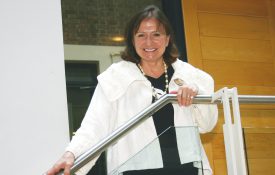-

Cooperation Driven by Reciprocity, Not Conformity
Our desire to reciprocate another person’s cooperative gestures outweighs our desire to conform with group norms.
-

Science Reveals a Silver Lining to Dark Behaviors
For psychological scientists, exploring the less pleasant aspects of individual and social nature is an occasional necessity.
-

New Research From Psychological Science
A sample of new research exploring cost-benefit arbitration and reinforcement learning, race and weight-based stereotypes, and testosterone and cognitive reflection.
-

Remembering Annette Karmiloff-Smith
Mark Johnson University of Cambridge and Birkbeck, University of London Susan Goldin-Meadow University of Chicago APS Past Board Member Annette Karmiloff-Smith passed away on 19 December 2016, and psychological science lost a brilliant developmental
-

Link Between Positive Emotions and Health Depends on Culture
Positive emotions are often seen as critical aspects of healthy living, but new research suggests that the link between emotion and health outcomes may vary by cultural context.
-

Motivating Messages Differ for Underdogs and Favorites
To craft motivating messages, you need to know which side your target audience is on: the favorite or the underdog.

